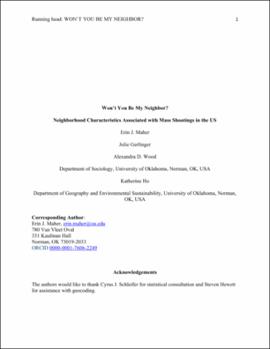| dc.contributor.author | Maher, Erin J. | |
| dc.contributor.author | Gerlinger, Julie | |
| dc.contributor.author | Wood, Alexandra D. | |
| dc.contributor.author | Ho, Katherine | |
| dc.date.accessioned | 2022-06-07T20:10:49Z | |
| dc.date.available | 2022-06-07T20:10:49Z | |
| dc.date.issued | 2021-10-28 | |
| dc.identifier.citation | Maher, E.J., Gerlinger, J., Wood, A.D. et al. Won’t You be My Neighbor? Neighborhood Characteristics Associated with Mass Shootings in the USA. Race Soc Probl (2021). | en_US |
| dc.identifier.uri | https://hdl.handle.net/11244/335861 | |
| dc.description.abstract | We measure the association between neighborhood characteristics and mass shootings building on existing research on neighborhoods and social and economic composition and crime. Using publicly available national data from the Gun Violence Archive (2014–2019), we geocoded and merged mass shooting incidents with US Census American Community Survey data. Our bivariate results suggest that census tracts with a mass shooting are more economically disadvantaged and have greater concentrations of black and Hispanic residents. In multivariate models, the association with concentrated disadvantage is no longer significant and the likelihood of a mass shooting increases until the proportion of black residents reaches 80%, at which point the likelihood decreases, controlling for other community characteristics. Further, as the proportion of black residents and the level of disadvantage increase together, the odds of a mass shooting incident in that tract are reduced. To address and prevent mass shootings, an expanded theory of neighborhood crime that incorporates the unique nature of mass shootings needs to consider structural racism, racial dynamics, and protective factors in relationship to economic conditions. | en_US |
| dc.language | en_US | en_US |
| dc.subject | Gun violence | en_US |
| dc.subject | mass shootings | en_US |
| dc.subject | community characteristics | en_US |
| dc.subject | crime | en_US |
| dc.title | Won't You Be My Neighbor? Neighborhood Characteristics Associated with Mass Shootings in the US | en_US |
| dc.type | Article | en_US |
| dc.description.peerreview | Yes | en_US |
| dc.identifier.doi | https://doi.org/10.1007/s12552-021-09350-3 | en_US |
| ou.group | Dodge Family College of Arts and Sciences::Department of Sociology | en_US |
